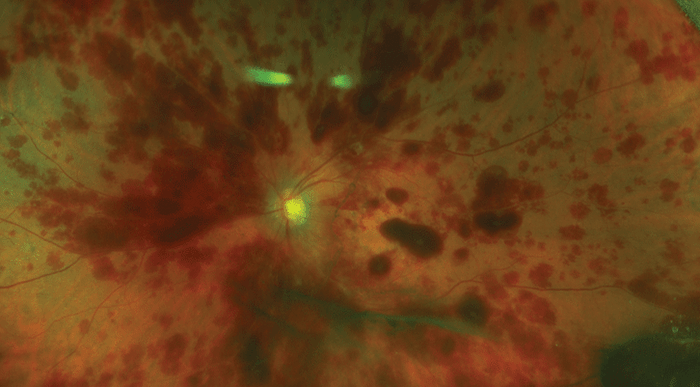
The recent news that three female patients suffered vision loss after receiving an unproven stem cell therapy for age-related macular degeneration (AMD) has shocked clinicians, scientists and the public alike. Published in the New England Journal of Medicine, the report described a range of complications suffered by the women (including vitreous hemorrhages and retinal detachments) after they’d received bilateral intravitreal injections of autologous stem cells prepared from adipose tissue (1). A year later, one patient was totally blind, and the other two were left with vision ranging from 20/200 to light perception. So what happened? The authors suggest that contamination of the injected material, and/or proliferation of the “stem cells” into myofibroblasts might have been responsible.
- The events have opened a regulatory ‘can of worms,’ raising concerns about the oversight and regulation of innovative therapies. The report brought three disturbing points to light: the study was
- listed on ClinicalTrials.gov (NCT02024269) at least one of the patients believed they were participating in a clinical trial for AMD
- the women each paid $5,000 to receive the experimental treatment.
Here, we take a look at some of the reactions… Jeffrey Goldberg, ophthalmologist at Stanford University, Palo Alto, California (2): “There is a lot of very well-founded evidence for the positive potential of stem [cell] therapy for many human diseases, but there’s no excuse for not designing a trial properly and basing it on preclinical research.” Thomas Albini, ophthalmologist at Bascom Palmer Eye Institute, Miami, Florida (2), (3): “In this case, these women participated in a clinical enterprise that was off-the-charts dangerous [...] I knew that things like this could happen in other countries that don’t have a sophisticated medical regulatory environment. But I really was naïve to the fact that this could happen in the United States. Then I realized I was just as naïve about it as the patients were.” George Daley, leading stem cell biologist and Dean of Harvard Medical School, Boston, Massachusetts (4): Daley wrote that there was a “stark distinction between innovative treatments that are founded on methodical preclinical evidence” and “the unproven interventions that are offered by practitioners who are naïve regarding the biological complexities of stem cells or by charlatans peddling the modern day equivalent of snake oil.” He added that it represents a “gross violation of professional and possibly legal standards.” Stephen Rose, Chief Research Officer at Foundation Fighting Blindness, Columbia, Maryland (5): “What’s important for the public to know is that the [ClinicalTrials.gov]website listing does not mean that the procedure is approved by NIH and has undergone FDA review and authorization […] Unfortunately, there are many unregulated ‘trials’ that are taking advantage of the desperation associated with loss of vision, and peoples’ vision and lives are at risk.” Peter Aldhous, BuzzFeed News Reporter (6): “Inquiries by BuzzFeed News reveal that the original ethical approval raised troubling questions from the start […] The ICMS ethical board that approved the trial included one doctor whose medical license had been placed on probation for failing to meet the ‘applicable standard of care’ in his own medical practice, plus another who had earlier been convicted of violating federal law by breaching a patient’s medical privacy.” Michael Tomás, CEO of U.S Stem Cell (the company affiliated with the clinic) (3): In a responding statement to the Miami Herald, Tomás wrote “For nearly 20 years our clinics have conducted more than 7,000 stem cell procedures with less than 0.01 percent adverse reactions reported.” According to the article, he declined to comment on the patients involved, but confirmed that the clinic was no longer offering eye treatments.
References
- AE Kuriyan et al., “Vision loss after intravitreal injection of autologous ‘stem cells’ for AMD”, N Engl J Med, 376, 1047–1053 (2017). PMID: 28296617. Stanford Medicine News Center. “Unproven stem cell ‘therapy’ blinds three patients at Florida clinic”, (2017). Available at: http://bit.ly/StanMed. Accessed March 27, 2017. D Chang, Miami Herald. “Three women blinded after stem cell injections at Broward clinic”, (2017). Available at: http://bit.ly/MiamiH. Accessed March 27, 2017. GQ Daley. “Polar extremes in the clinical use of stem cells”, N Engl J Med, 376, 1075–1077 (2017). PMID: 28296612. Foundation Fighting Blindness. “NEJM article on unregulated stem-cell therapy describes severe vision loss for three Florida women”, (2017). Available at: bit.ly/FFBrelease. Accessed March 27, 2017. P Aldhous, “An experiment that blinded three women unearths the murky world of stem cell clinics”, BuzzFeed News (2017). Available at: http://bit.ly/AldhousBuzz. Accessed March 27, 2017.
